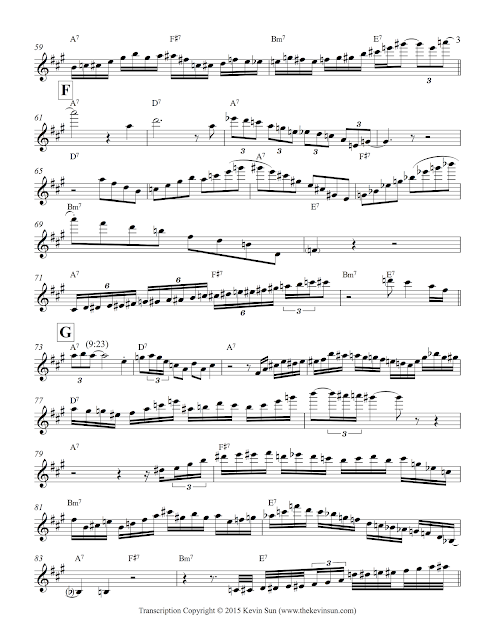Mark Turner on "South Hampton"
In preparation for the two-part essay on Mark Turner that I wrote for Music & Literature (accessible here: Part One, Part Two), I decided to transcribe some Mark.
Prior to researching and writing this piece, I had consciously avoided listening to Mark for the past couple years. Like Steve Coleman or Bird or Trane, Mark's stylistic gravity is immense; I knew that if I got too close too early, it'd be hard to extricate myself later on. But I thought it was time for me finally to confront this singular saxophonic voice.
This nine-chorus solo over a G blues is worth comparing to Mark's solo on "Hesitation Blues" on 1997's The Two Tenors, the Warner Bros. release that paired a younger Mark with James Moody. That blues is also in G, also fairly medium-slow, and distinctively Turnerian in its delivery and intervallic-melodic vocabulary, but 16 years later, it's clear that Mark has refined his language while gaining more rhythmic intensity, which is unmistakable in a bare, familiar context such as this. (Tubist Ben Stapp already transcribed "Hesitation Blues," although you'll have to read it in tenor clef).
Writing about Mark's language on the horn and on paper was a real challenge; writing about his musical language for an ostensible audience of culturally well-read non-musicians on top of that was even harder, but I learned a great deal in the process. Speaking with musicians about Mark's playing was a lot of fun; I felt like I was getting the insider perspective, then trying to figure out how to translate it for a broader audience.
Walter Smith III, a widely influential tenorist now in his own right (walk around Berklee practice rooms today and you'll hear what I mean), shared some really saxophone-specific insights into studying Mark first hand:
“What’s weird to me is sometimes there’s stuff that I’ve transcribed, like lines here and there, and I’m listening to it, I’m like, ‘Man, what is that?’ And then I start writing it out and it’s kind of like this weird version of a bebop line that I already kind of know, and as I start getting the first ten or eleven notes, I’m like, ‘Wait.’ And I hear it in a different way when I know what it is, you know what it mean?
Even stuff that starts low in the horn, it seems like something that it’s not, and I don’t know if it’s his sound or what. I don’t have perfect pitch, but I have perfect saxophone pitch: if you hear it playing, you don’t even have your instrument, you know exactly what all of it is. But something about him, I don’t know if it’s the timbre or what, but some of it is a little bit blurry. I’m like, ‘It could be this, this, or this,’ and I don’t know exactly what it is, and when I try to figure it out, I’m like, ‘Wait, this is a straight up...’
Like there’s a couple things that I know and a couple things I had to wean myself off of playing, but they were straight up bebop lines, but when he plays it and maybe the placement of where he plays it, it doesn’t come across that way at all.My working theory right now is that, depending on how much a tenor player lays into the natural timbral tendencies of the horn, it's easier or harder to tell exactly what notes they're playing. Coltrane, for me, has always been easy to transcribe with "perfect saxophone pitch" — his sound across the horn always seems to accentuate the intrinsic resonances of each note on the horn. Stan Getz, by comparison, tends to be blurrier for me; his sound, which smooths out some of those natural edges and contours on the horn, can trick me at times, and Mark is the same way. I wanted to write about this more in the piece, but it didn't really seem to fit anywhere, hence, here, jazz saxophone nerd central.
Walter also pointed out Mark's deep rootedness in bebop, which is uncanny in its estranged familiarity at times:
I also feel that it’s switched from totally coming from a bebop approach to being what it is now. Going back to that Warner Jams [The Two Tenors], it was almost like a weird, out or unique version of bebop, where now if I feel like I heard him play a blues, it would not be anything like that, but it would be the same language.Take a listen and see what you think.
Solo Transcription:
C
Bb
Eb
*The PDFs say "2014," which is a mistake; according to YouTube, this show was in 2013.
Also possibly of interest:
James Moody & Mark Turner on "The Plain But The Simple Truth"




Comments
Post a Comment